This US church with expansion in its DNA wants to open a temple in China
Every Sunday, when members of the Church of Jesus Christ of Latter-day Saints (LDS) meet in the conference room of a blue-glass skyscraper in downtown Shanghai, one person always takes a seat right at the back, by the doors.
They are there to intercept the wrong person coming in. This is not to protect any religious mysteries; Mormonism is not a particularly secretive faith and usually seeks out new converts, but because if a Chinese passerby were to join the service, it could mean all those taking part were breaking the law.
There are only five state-sanctioned religious associations in China, all under the tight control of the Communist Party. Others walk a delicate legal tightrope, with the threat of a crackdown always hanging over their heads. While the government tolerates foreigners practicing their religion and attending services together, it takes a hard line against anything approaching proselytising or missionary work, a prohibition the Mormon Church takes seriously.
"We have to ask to see if they have a foreign passport to attend," said Jason, a lifelong member of the Church who worked in Shanghai for almost a decade until relocating back to the United State in 2018. "I have frequently been this person watching the doors and on many occasions I have sadly had to turn away Chinese citizens who wished to worship with us."
And that is during the good times. In recent years, the Chinese government has increased its regulation of religious worship, launched crackdowns against underground churches and instituted new restrictions on those faiths which operate in the grey area of only catering to foreigners.
So the Church's announcement on April 5, that it plans to open a temple in Shanghai, the first ever in mainland China, was seen by some as a bold decision.
The Church claims it won't change anything, but the idea that a US church with expansion in its DNA could open an official temple in China is likely to be controversial -- and may not be allowed by Beijing. Already, authorities in Shanghai have suggested that the announcement was made without their prior approval, even as experts said the Church would likely never have revealed the plans without a clear go ahead.
In Salt Lake City, Utah, the spiritual headquarters of the US-based Church, Jason "could hardly believe" the news.
"I couldn't have imagined that we would ever have a temple in Shanghai at this time," he said. "Immediately, my WeChat started lighting up as we were all expressing joy and excitement with our China friends."
Jason is a pseudonym. Like several other current members of the Church interviewed for this story, he requested anonymity to speak about its functioning in China without the permission of Church leadership.
The Church of Jesus Christ of Latter-day Saints declined multiple requests for an interview for this story, referring CNN to a website about its operations in China and President Russell Nelson's statement on April 5.
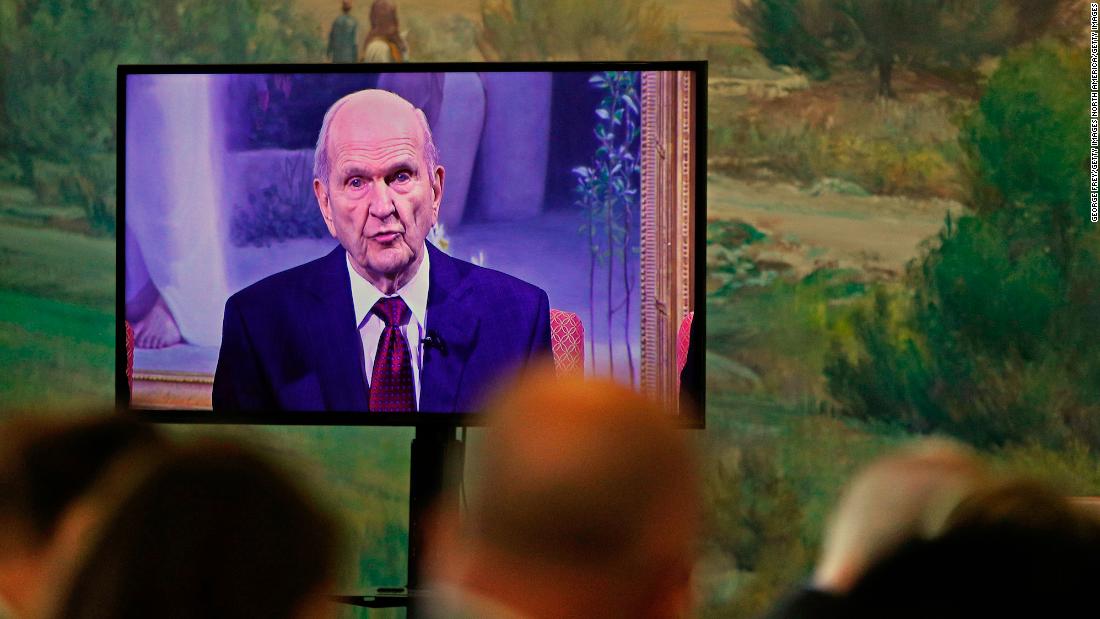
Members watch as Russell M. Nelson President of the Church of Jesus Christ of Latter -Day Saints, makes an announcement in January 2017. Nelson said this April that the Church will open a temple in Shanghai.
In the beginning
Founded in upstate New York by Joseph Smith in 1830, it took the Mormon Church some 117 years to grow from six initial members to its first million. Today, it claims more than 16.5 million members globally, with most outside the US.
While the true size of the church is debated (some say they include members who are no longer active) one thing is clear: the massive growth of the Church has been achieved through the work of thousands of missionaries.
Smith said he received a revelation in February 1831, in which God told his followers to "go forth in my name, every one of you" and "build up my church in every region."
That is how the Church arrived in China over a century and a half ago.
Its start in the country, however, was less than auspicious. In 1853, its then-leader Brigham Young dispatched three missionaries to British-controlled Hong Kong, then a common staging ground for those seeking to spread the gospel in China.
When they arrived, however, they realized that China was in the midst of a bloody civil war, making travel outside of Hong Kong exceptionally dangerous. Their reception in the city was not much better, as the English-language press ran lurid articles about the Mormon faith and accused the faith of blasphemy. Their funds running out, they struggled even to find a Chinese teacher.
"Our staying here to learn the Chinese language without one friend or one possible recourse to us appears totally impractable (sic)," the missionaries wrote in a letter to church leaders as, less than two months after they had arrived in Asia, they boarded a ship bound for California, historian Stephen Prince recounts in his biography of one of the missionaries, Hosea Stout.
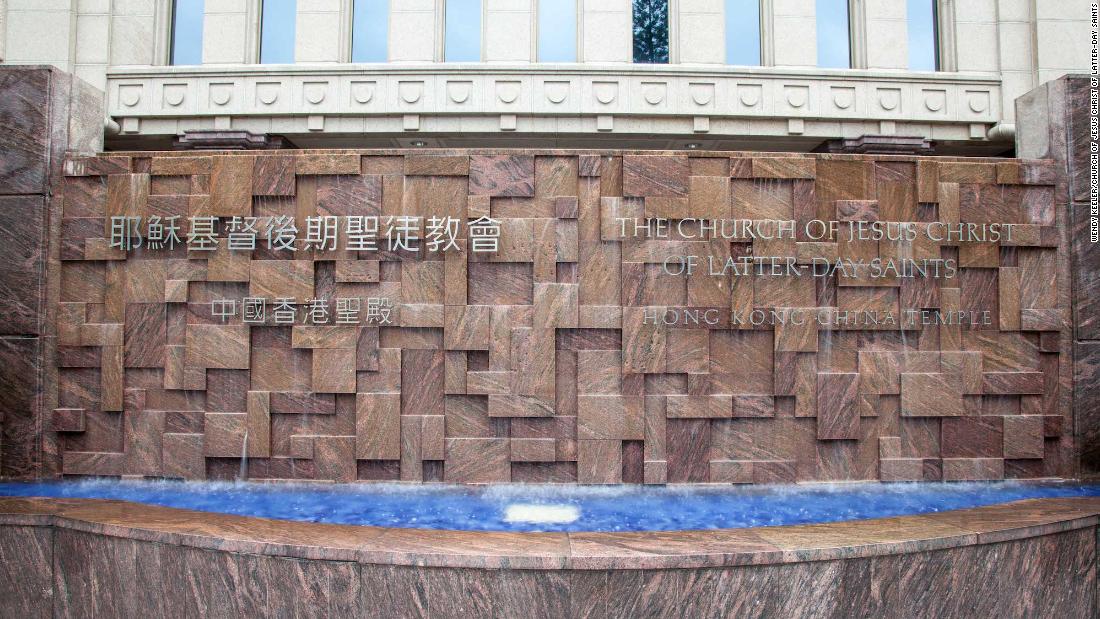
A sign outside the Hong Kong China Temple of the Church of Jesus Christ of Latter-day Saints in Kowloon, Hong Kong.
It was not until 1949 that the Church established a permanent presence in Hong Kong, with the intention again of using the city to get a foothold into China.
"Nearly one billion of our Father's children live in China," then-President Spencer Kimball said in 1978. "If we could only make a small beginning in every nation, soon the converts among each kindred and tongue could step forth as lights to their own people."
Beginning in 1980, Church leadership began reaching out to the Chinese authorities to try to get permission to operate in the country, and in 1986, small church branches -- meeting houses -- were organized in Beijing and Xi'an, though only those holding foreign passports were permitted to attend. According to the Church, today there are around 10 meeting houses across mainland China. By comparison, there are around the same number in Hong Kong alone, and more than 50 meeting houses in self-governed Taiwan, where the Church claims around 61,000 members.
Despite this apparent lack of progress, Church leaders say they have built a strong relationship with the Chinese authorities, and in 2010 they announced moves to "regularize" their activities in the country.
"The Church deeply appreciates the courtesy of the Chinese leadership in opening up a way to better define how the Church and its members can proceed with daily activities, all in harmony with Chinese law," spokesman Michael Otterson said at the time. "They have become thoroughly familiar with us through numerous contacts, and they have seen how we and our members operate in China. They know that we are people of our word when it comes to respecting Chinese law and cultural expectations."
Currently, two types of Mormon worship are permitted in China: services for foreign nationals, and services for Chinese nationals who converted while overseas. The two are kept separate, and the Church is careful to avoid any sign of seeking to expand its Chinese membership within the country. Unlike with other countries in which it operates, however, the church does not provide membership figures for China.
Building trust
The Chinese Communist Party has always had an uneasy relationship with religion. The state is officially atheist, and the tens of millions of Party members are barred from holding religious beliefs.
Despite a constitutional commitment to religious freedom, only a handful of faiths are permitted to operate, each under umbrella organizations with strong links to the Communist Party.
Two are considered domestic faiths -- Buddhism and Taoism -- while the others are foreign religions, with varying historical pedigrees in the country, Islam, Protestantism and Catholicism, though Chinese Catholic organizations operate separately to Rome.
Other religions fall into a grey area: the State Council says it is "open" to foreign organizations -- but only if they respect China's sovereignty and principle of religious self-administration.
In practice, this means religious bodies' first loyalty must be to the Communist Party, not a foreign Church leadership. This point has caused a long-standing rift with the Vatican since the establishment of the People's Republic, and Chinese Catholics operate separately to the global church, though some progress has been made towards rapprochement in recent years.
Despite this, religious practice is on the rise. But alongside this growth in belief has come increased suspicion of "foreign" religions, particularly Islam and Christianity (though both have long-histories in China). Muslims in the far-western region of Xinjiang have had their religious practices strictly curtailed, while underground Christian churches, once broadly tolerated, have been cracked down upon.
Indeed, around the time Nelson was making the announcement of the new temple, International Christian Concern, a US-based advocacy group, said that believers holding Easter services online were raided by the authorities. Local police could not be reached for comment, the Early Rain Covenant Church which organized the service is considered an "underground," or unlicensed, operation and has previously been ordered to cease activities, according to Human Rights Watch.
"The Chinese government is very suspicious of religion as a vehicle for potential political opposition," said William Nee, a Hong Kong-based researcher for Amnesty International.
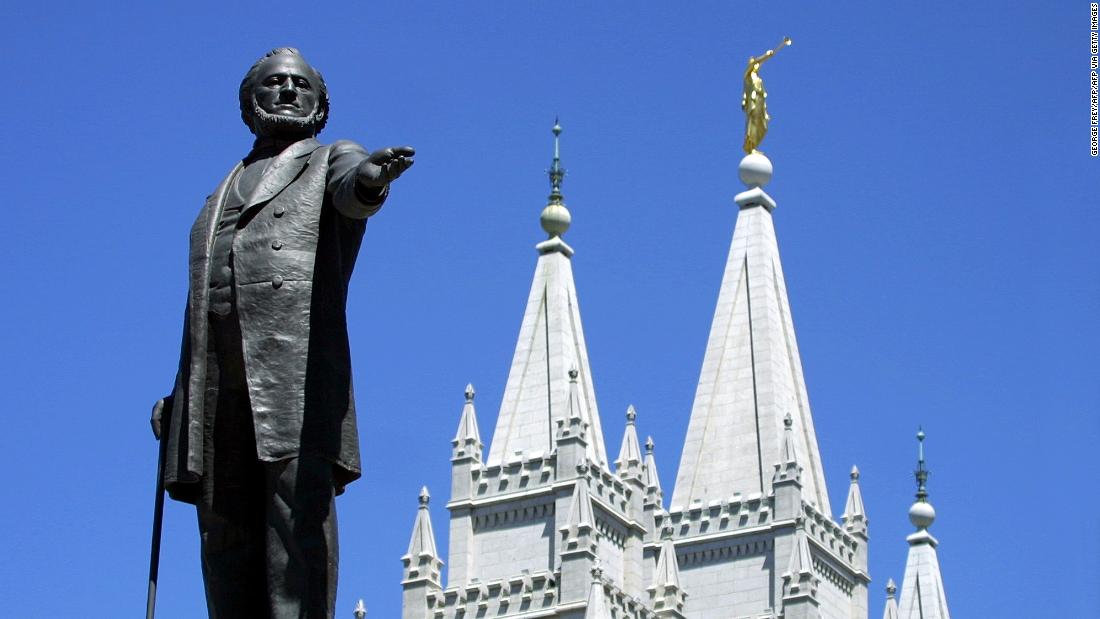
A statue of Brigham Young, second president of the Church of Jesus Christ of Latter-day Saints stands in the center of Salt Lake City, Utah with the Mormon Temple spires in the background.
Pierre Vendassi, an expert on Christianity in China, said that the government "is mainly trying to take back the control over religious activities, and uses full force to do so, after a period of time when people could almost freely opt for unregistered, unmonitored religious activities, without facing any consequences, most of the time."
"Now the message is clear: either accept state control, monitoring and restrictions, or face state hostility," he said. "For the Christian activities, the purpose is to get house churches and Catholic underground church back under control."
As far as non-official faiths go, the Mormon Church is perhaps the gold standard for such a group in China. Current and former members, as well as outside observers, agreed that the Church is scrupulous about following Chinese law and avoiding anything that could be seen as proselytization.
Nee contrasted this with "other forms of Protestant Christianity or evangelical traditions coming out of the US, who have a much more aggressive or underground strategy for spreading the faith."
Sarah, a Mormon who worked as a university professor for several years in China, said she "did not tell people what church I belonged to or even if I belonged to a church."
"Some friends would ask me if I was Christian. I would say yes (but) we do not talk about it in China," she said. "They would nod and agree. That is as far as the conversation would go."
Marcelo Gameiro, a Church member living in Shanghai, said that he does not talk about the church "because it is against the law."
"But I don't hide (that) I am a member of the church," he added. "When I was in Huzhou, I used to go to the Hangzhou branch, it took me three hours to get there, and people started to notice I was going somewhere every Sunday dressed in a tie, so I did tell them where I was going with no problem, I just did not preach the gospel to anyone."
Sarah said she would "occasionally see Christian religious groups that would come in and rather openly flout the rules of China." American students would get scholarships in China and then try and convert their classmates.
"Several times I talked to them about it, I asked is this the right thing to do, are you making a good example," she said. "I heard from Chinese people who got rather angry because people would come from other countries and give away Bibles and start conversations about religion, and they would say we are not allowed to talk about this in China."
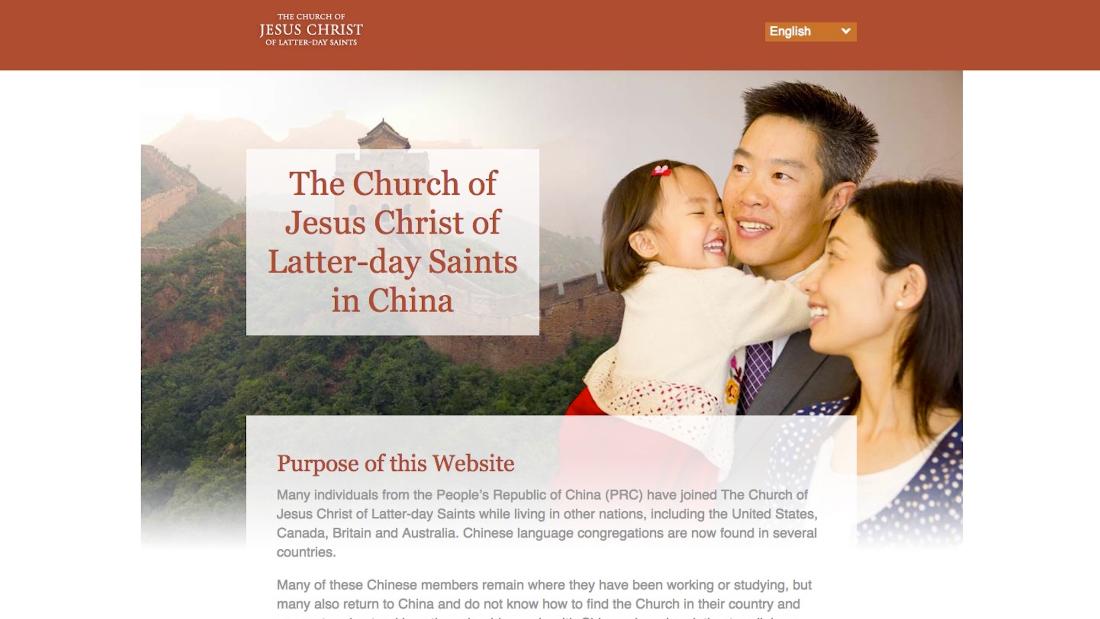
A screenshot of a dedicated website set up by the Church of Jesus Christ of Latter-day Saints for members in China.
Playing the long game
John Wakefield, a now ex-Mormon who came to Hong Kong as a missionary in the 1980s and still lives in the city, said a big part of the Mormon religion is "we're going to convert the whole world" and that it's the fastest growing church in the world. "For them, numbers are really important," he said.
Another former Mormon, Bryce Bushman, who lived in China for almost four years, where he worked as an urban planner and designer, said that: "Mormon doctrine states that the LDS Church will eventually cover the whole Earth."
"It's considered a prophecy, something that is definitely going to happen at some point in the future," he said. "This gives both the church organization and the members of the church a kind of patient confidence that eventually every nation on earth will allow Mormon missionaries to proselyte and establish church congregations."
Mormon doctrine also permits "baptisms for the dead," allowing for the potential salvation of those already deceased, who can then "choose to accept or reject what has been done in their behalf." This alleviates somewhat the need to spread the word of Jesus to people before they die, has been stated as a motivation for some evangelical missionaries to take great risks in the name of saving souls.
This patience allows the Church to play the long game in China, confident that one day it will be able to bring its message to the country's vast population.
Josh Steimle, a practicing Mormon who lived in the Chinese city of Shenzhen for two years, said it "would have been so easy to pass along the URL to a Church website to someone who was curious, or give them a Book of Mormon, or a pamphlet about the Church."
"It was very difficult because we're a Church that believes in sharing what we believe, and we're always being encouraged to be good missionaries, and then to move to China and be told to not say a word about what we believe seems to be contrary to everything we've been taught," he added. "But it's all about the long term vs. the short term. If we shared our beliefs in violation of Chinese law, a few people might join our Church and then the Church would be shut down and kicked out of the country."
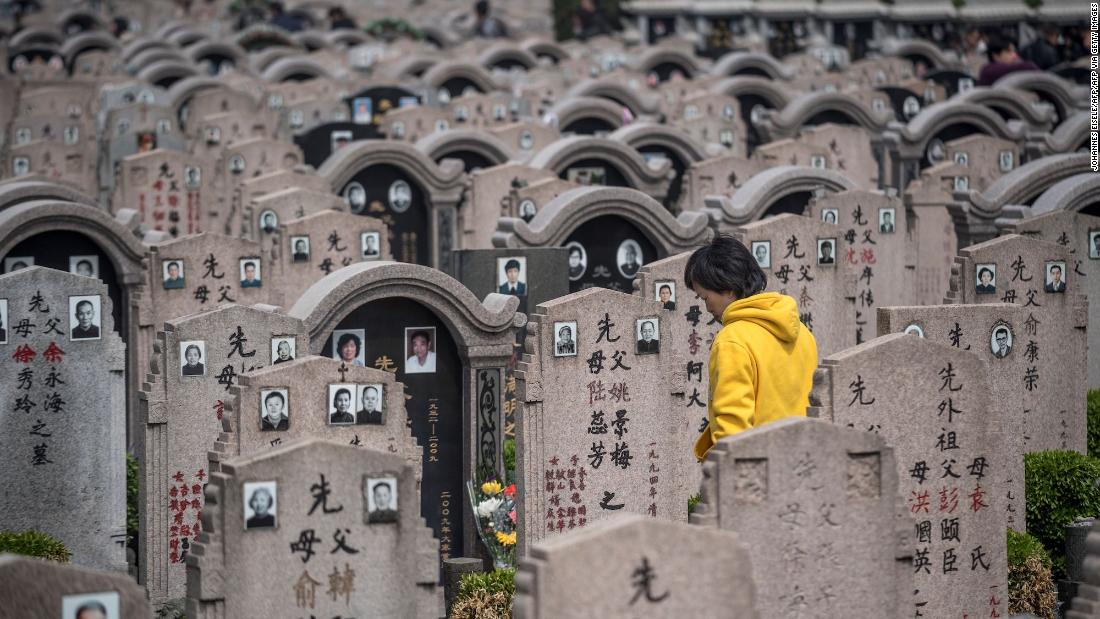
A woman decorates a grave during the Qing Ming festival, also known as Tomb Sweeping Day, at a cemetery in Shanghai on April 6, 2018. Traditional religious practice is growing in China, but the government tightly controls foreign faiths.
Temple doctrine
On paper, a temple should not be too much for the Chinese authorities to stomach.
In its description of the proposed temple in Shanghai, the Church is clear that this does not represent a climactic shift, nor will the Chinese temple be anything like the grand white stone buildings that dot many American cities.
"It would be modest in appearance. It would fit and be consistent with local custom and environment as a place of peace, tranquility, and dignity," the Church said of the proposed temple, which it said is intended to serve as a replacement for the Hong Kong building, which is currently closed for "long-planned maintenance and renovation."
It said that entry will be limited to Chinese members of The Church of Jesus Christ of Latter-day Saints -- those who have converted overseas and returned to China -- adding that this "does not represent a change in the legal status" or the ability of missionaries to operate in China.
Unlike a regular church, Mormon temples are not open to non-members, and even those within the Church must be considered in good standing and receive a "recommend" from a Church official in order to enter.
While the Church appears to be downplaying the significance of a potential temple, all current and former members interviewed by CNN agreed that it would be a major achievement.
Steimle said that it was "difficult to express how big of a deal this is for me, personally, other members of the Church who have ties to China, and really to the entire Church membership worldwide. It's going to be a very small temple, but it's a huge thing for the Church."
Temples are where the most important and sacred Mormon ceremonies are carried out, including baptisms and "celestial marriages."
If established, the temple would not be the first active place of worship in Shanghai for an unofficial religion. In recent years, limited services have been held at the Ohel Rachel Synagogue, a historic building that predates the establishment of the Communist state. Most Jews in China however continue to practice behind closed doors, in arrangements similar to Mormon meeting houses.
Whether Mormons in China will be able to get nearer to that presence remains to be seen. In a statement issued two days after the Church's announcement, the Shanghai Municipal Bureau of Ethnic and Religious Affairs said that "according to the relevant laws and regulations of China, foreigners are not allowed to set up religious organizations or venues for religious activities in China."
The bureau denied any knowledge of plans for a temple in Shanghai, saying they were the "wishful thinking of the Mormon Church in the United States."
When CNN asked the Church about the current status of the project, a spokesman would only provide a link to the Church's website detailing plans for the temple and how it would operate. Church representatives would neither confirm nor deny the veracity of the original statement announcing the temple. However, since reporting on this story began, reference to the Shanghai temple has been removed from the Church's website, though it is still available on an archived version of the page.
Vendassi, the expert on religion in China, said that despite this apparent denial by the authorities, a temple may still end up opening at some point in the near future.
"If an LDS temple has been announced in Shanghai, I think it means they probably had a 'go' from Chinese officials to do so," Vendassi said. "Even if the government says it is a unilateral statement -- they actually have no interest in making a bilateral statement, because that would send a message of religious openness."
Nee, the Amnesty researcher, said that while there was no reason on paper for the Chinese authorities to object to a temple, he doubted whether officials "would be willing to understand the nuances of religions and their theologies" in order to permit such an institution.
As a uniquely American religion, Mormonism's hopes in China may also be hurt by worsening relations between Washington and Beijing. In the same month the Shanghai temple was announced, Senator Mitt Romney said the coronavirus pandemic had exposed China's "grand strategy for economic, military and geopolitical domination."
Romney is by no means alone in criticizing Beijing, but as the country's highest-ranking elected Mormon, his words may carry more weight with China's leaders when they are considering the Church's position there.
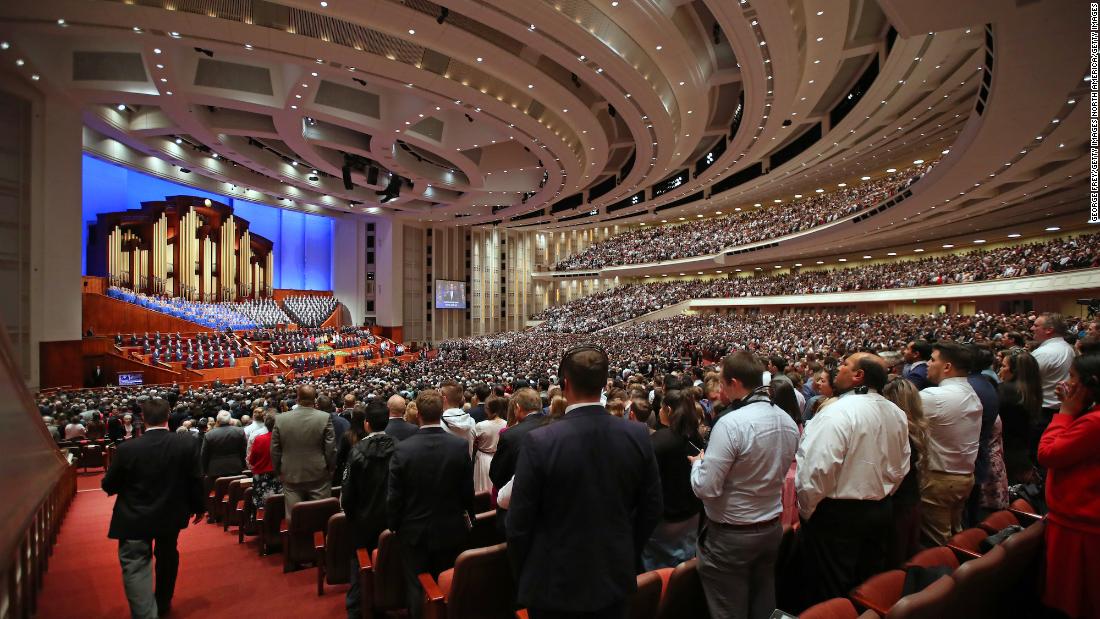
Over 20,000 members of the Church of Jesus Christ of Latter-day Saints and the Tabernacle Choir at Temple Square sing a song together at first session of the 189th Annual General conference of the church at the Conference Center on April 6, 2019 in Salt Lake City, Utah.
China change
If the Mormon Church does have to exercise more patience before they open a temple in mainland China, what are a few more years or decades after a century and a half?
Responding to a question of when China would be open to missionaries in 1991, Elder Dallin Oaks -- a senior Church leader -- said that "I state my belief that China is already 'open' -- it is we who are closed ... We must understand their way of thinking ... observe their laws, and follow their example of patience."
Quoting Mormon scripture, Oaks added that God "will bring His purposes to pass in that great nation 'in his own time, and in his own way, and according to his own will'."
Mormons who lived in China spoke of the country with great fondness, despite the restrictions placed on how they worshipped there. Both Jason and Sarah keep in contact with Chinese friends over WeChat, and hope to visit again in future.
Sarah saw many parallels between China and the Mormon people, pointing in particular to the importance of venerating ancestors in Chinese culture.
"My ancestors are special to me," she said. "Many of them joined the Church of Jesus Christ of Latter-day Saints while our first leader, Joseph Smith, was a prophet. Like the people of China who went on the (Long March), my people also traveled across a continent in search of their dream."
Two of Jason's four children were born while the family was living in Shanghai, and the kids went to local Chinese schools. Jason and his wife made a concerted effort to integrate into Chinese life more than many other expats around them, doing "many things that few foreigners experience in China."
"We didn't speak any Chinese when we came but we did when we left," he said. This brought him closer both to locals and to other members of the foreign Mormon community who weren't as comfortable operating in China.
"I can't possibly begin to count the number of people we had over for dinners, the people we took shopping because everything the supermarket was unfamiliar, how many people we helped to simply get a Chinese phone number and register for WeChat, both for members of our Church and those who were not."
Both were optimistic about the future of the Church in China, but emphasized the need for patience, a view shared by Steimle.
"Great progress usually doesn't happen in a straight line," he said. "Although there have been crackdowns on religion in China, perhaps the obedience of our members and the trust and friendship our Church leadership has built up over the years by working openly with the Chinese government will help open doors."
News Courtesy: www.cnn.com











